Day 1 Session Notes–Hiring in DesignOps: A Critical Study on How to Hire and Get Hired
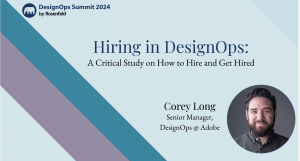
— Good morning everyone and I’m excited to speak with you today and share my story
- I had a year of unemployment and searching for work
— This talk will be about best practices to get hired and the job search process
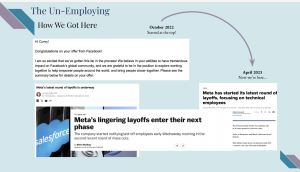
— I’ll start with my low point of becoming unemployed
- I did end up with a job at the end of experience with current role
— Particular journey began with October 2022, where Meta sent me an offer for a Design Operations Manager position
- But, and this was a common pattern, I was part of mass layoff in 2023
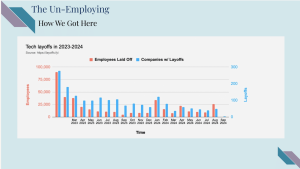
— I hope this topic would be dated, but layoffs have continued
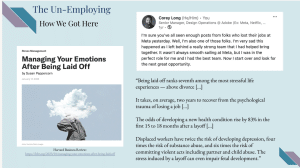
— The numbers regarding the layoffs are staggering to read about, and emotional and physical effects experienced are real
- Seventh among most stressful experiences people can have, ahead of divorce, and it takes two years to recover from trauma of unwilling losing a job
— I personally had bouts of depression, anxiety, and feeling lost
— Morning of email was very difficult, where I wished my team well, and gave out the obligatory LinkedIn post
- Balance of gratitude and putting self out there
- I activated my network and connections
— Lot of processing and recovering prior to going back to market
- Didn’t have much time, given I was the sole earner for my family
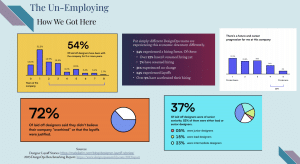
— As I took stock of micro challenges, I considered the macro environment
— The macro environment was as follows:
- Layoff greatly impacted already lean teams, but 20-30% of teams face reductions or hiring freezes next year
- Detrimental with DesignOps which already small teams, and short-tenure
— 52% of those laid off were senior or lead designers, and others had been with the company for 2+ years
— Cascading challenges resulted
- Hiring market more competitive with more candidates in the mix
- Reductions mean fewer roles available
- For those in design and DesignOps, less opportunity for career progression
- Tons of candidates below experience level, and companies can risk overwhelming candidates who are not ready, or risk overqualified candidates leaving at next opportunity
- Test what you are willing to accept lower level role or if you’ll wait for the right one, and even if you have option
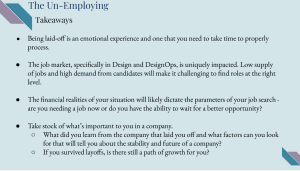
— Get people in same headspace for 2023
— My takeaways
- Emotional experience to properly process
- Job market in design and DesignOps is uniquely impacted and it is challenging to find roles at right level
— Financial realities of your situation will dictate parameters of job search
- Do you take job now or can you wait?
— Take stock what’s important to you in a company
- What did you learn from company that laid you off? And what factors can you look for future that will tell you about the stability and future of a company?
- Is there a path to growth in the company, even if you survived the layoffs?
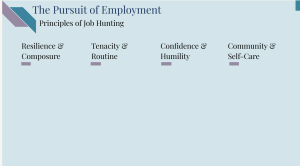
— What did I do? The pursuit of employment
- Resilience was most important trait as I went through many, many interviews
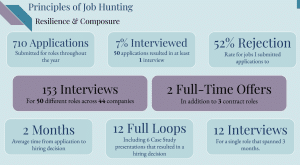
— Four principles applied in my search
- Resilience and composure
- Tenacity and routine
- Confidence and humility
- Community and self-care
Resilience
- I had 710 applications, and only 7% led to an interview
- 52% sent rejection emails
- 2 months on average time from application to hiring decision and some roles took as long as 4-5 months to get through the process
- 12 full interview loops
- 12 interviews were for single role that spanned three months
- Total of 153 interviews across companies and two full-time offers
— It was a lot of rejection to get a few offers
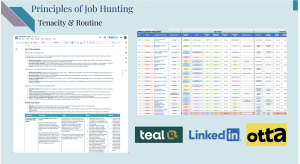
— To get results, I needed a productive routine and use all connection, resources, and tool to manage the experience
- Job-hunting truly was a full-time job
— With tenacity, I created an interview guide to write down values and my philosophy. The guide included:
- Answers for behavioral interviews
- Notes on interviews and questions to ask
- I used the document for offer comparison
- Created an application tracker and roles for just one interview, and tracked role, hybrid, manager, and ranking based on various factors
— There are links to templates available on resource list
— Other tools included:
- LinkedIn for referrals and sharing stories and more— took detox once I got a job
- Teal— For analyzing job applications, and the application process
- Otta— Focused job board on insights and daily digests of roles interested
— My routine was as follows:
- Spent 2-3 hours looking at job postings and applying. Easy to do in morning to get brain going
- I then took a break for lunch and unwind
- Afternoon work was on big picture things for actual interviews like a portfolio job tracker, and reaching out to colleagues for advice or check-in
— The more time I spent in job market, the more time I felt this was necessary
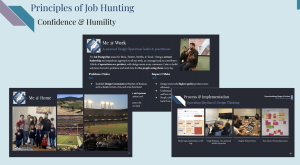
— Everything shared helped me apply and get interviews
- Had to be confident, and referenced values and philosophies with interview guide, even when tired or down mood had to dig in and find confidence for best self
— Humility
- One interview got past final round, and felt process would work and get results needed
- Found out was runner up for the role, and didn’t know what else to do
- Saw former colleague was hired, and asked about their edge and a review of portfolio presentation
- This helped me hone narrative and refocus examples for what was relevant for position I was applying for
— Next two portfolio demos gave me offers, and it came from being humble and reaching out for help
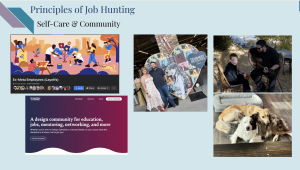
— I won’t like act like I was best self for year, and felt down and unproductive
- Balanced working for contract role and job as father and husband and human being
— Applied to job in phone and scheduling too many interviews
— Leaned on community like Facebook groups, Slack channels, and discord groups, as well as company alumni
- Groups like DesignOps assembly and communities also gave strength to keep going
— Family gave hime strength to continue
- Humbling to ask for help, but gives hope and strength to keep pushing on
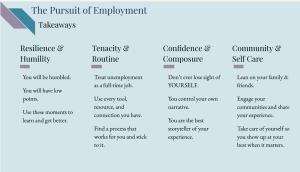
— You will be humbled, but need to use low points to get better
— Tenacity
- Use all tools you have
— Confidence
- Don’t lose sight of yourself, and once you get into interview be your authentic self, and not what company wants you to be
- You control narrative and best own experience
— Community and self-care
- Lean on family and friends
- Engage your communities and share your experience
- Take care of yourself and show up at your best when it matters
— Last note:
- I’ve interviewed a lot in career, but even with experience, I was relatively rusty,
- For folks who haven’t been on job market, goal to be polished as possible, so interviews must be leveraged as much as you can
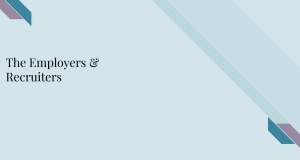
— You will show up as better you for interviews, and give yourself a better chance
— Address employers and recruiters on how you can improve
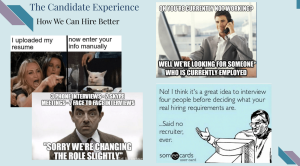
— Candidate application process wasn’t great, but companies roles get 100,000s of applications and have to balance day-to-day while interviewing candidates
- Recruiters are bombarded with tons of requests
— Hiring people is hard, but there are ways to be better
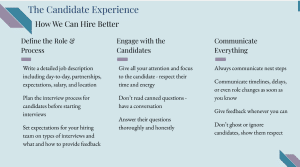
— Focus on three areas
- Defining Role and Process
- Writing out detailed job descriptions for the roles, such as day-to-day expectations
- Map out what candidate will go through in interview process
- Clarify what kind of feedback to provide it, and how, and make it structured and fair to applications
- Engage with Applicants
- Be present! Don’t eat lunch during an interview and give your full attention to candidates
- Good to have a question template, but make it conversational and human
- When people ask questions about company, answer honestly, candidate will appreciate it
- Communicate
- Let candidate hear about next steps, and keep them in the loop
- If you are aware of timelines delays, and even role changes as soon as you know. Candidates will appreciate honesty
- Give feedback when you can, despite limitations of what HR can say, it is super-appreciated from candidates and review
- Show people respect and if you know you won’t go through with candidate, show them the respect they deserve and be as professional as possible. People often won’t work for certain companies based on interview experience
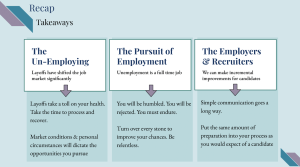
— So our main takeaways are:
- Layoffs shifted job market significantly, so take time to process and recover
- Market conditions and personal circumstances you have will dictate what to pursue
— Turn over all stones to improve chances and be relentless
— Incremental improvements for process, and put effort into improving process
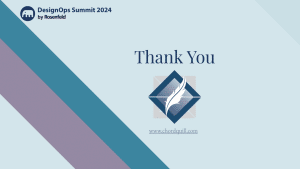
— Thank you for your time
Q&A
- What % of job postings were fake with no actual open role?
- Percentage-wise was 30%, and likely for internal roles, weirdness of what you can’t control with it. It was frustrating to experience.
- Did you make contact with recruiter? What was experience like?
- Usually recruiter won’t respond until they’ve gone through your application and referral
- Reached out to recruiter and didn’t get much response and reviewing something as dead-end or part of process
- Recruiters are being bombarded right now— and likely won’t respond, due to sheer overwhelm of application
- Did you feel you needed vacation and down-time prior to start-date?
- Took as much as possible, prior to starting.
- Post-mortem from unemployment was grasping mental toll it had, and two years to recover
- Still fighting against instinct that a late afternoon meeting will get you laid off
- How did you build down-time within unemployment? Vacation days from job hunting?
- Natural ebb-and-flow with leads. Wrapping up interviews some weeks, but weeks were nothing happening
- Natural way to step away and work and apply — wasn’t as intense in week like that
- Little breaks like Taylor Swift concert, and rested where I could
- How does job market and time away from job, change your ability to negotiate, given a company could go with someone else? Did you consider stop-gap jobs or jobs you actually wanted?
- Took contract roles to keep lights on, and companies wanted to act like you were fully committed, but trying to find full-time role can work against you with employers
- You can’t hide your true feelings, and will shift into mode of being fully engaged in job
- Bring energy for next-step jobs and what you want
- It all just depends and for negotiation, I was weighing two offers
- Little bit of negotiation power, but compared to previous career, where I had a lot of chances to play companies off of each other, but happy with what he negotiated
- In your experience, what is most important focus point to work on to ensure candidate experience?
- Bring org and HCD approach to day-to-day jobs, and leveling people up and bring empathetic approach to hiring process
- Will be hiring for role and taking experience you have, and tracking candidates — don’t be afraid to bring experience as candidate to job your in and process
- What feedback to give to new employer on hiring process?
- Thrilled with Adobe’s process and what stuck out to me was day of full loops were met with manager and four others throughout the day
- When finished interview, energized after full-loop
- Not the case for other interviews
- When finished interview, energized after full-loop
- Liked how manager treated me as a human-being compared to other jobs
- Noticing and valuing me, and connecting with me as human
- Experienced with other interview that ended with offer as well
- Having organized interview process helped, and despite bumps, people were transparent about what was going on
- Recruiter gave prep calls and guidance
- What Adobe did reflected best practices in presentation and best interview I had
- Having organized interview process helped, and despite bumps, people were transparent about what was going on
- Thrilled with Adobe’s process and what stuck out to me was day of full loops were met with manager and four others throughout the day

